Editor’s notes in prelude: Hello and welcome to threadings., the newsletter and podcast where we explore the bits of my politics which bind me at the seams. Today I have a candle called Cuba from Vela Negra and it's crackling in the background; it's going to keep me company. And the thing that I'm exploring today— some of the binding at my seams— is the process of review— in relearning lessons that younger iterations of me packaged and saved in the form of my pen. I always say that God gave me freedom so she gave me a staff and called it a pen. I find so much freedom in rereading the things that I've already written, (A) because I have no way of remembering them, and (B) because I am teaching myself. There's so much beauty waiting for me in the review.
The lesson of today is that pain is inherently isolating. I have more thoughts of the relevancy in today's piece in the editor's notes which close out the show. That's a paid Internet Friend space only because it's quite personal, and because I like to reward the people that give me the time freedom and the fiscal security to be able to be an artist with the notes on my creative process.
However, keeping in with my promises to provide all of my educational content for free, the lesson here is exemplified far above the paywall. It's as follows: there is no language which can adequately describe anguish. We, humans and fools, endeavor to be known anyways. We remain able to love only through approximations. It's like this. It's like that.
So here's to finding language enough to make homes inside of each other's hollowness.
Advice, Three Years or So After My First Wedding
Ismatu Bangura
Written: 5 December 2018
Edited: 22 October 2023
I have met no barrier to language in this life or any other that’s half as effective as pain.
When I was eight, I swallowed a chicken bone whole. I wasn’t choking, but it was cutting my throat on the way down, all the way down. My steady stream of tears triggered a constricting around the sharp ends of the bone, pushing it deeper into the tissue of my esophagus on its slow pilgrimage to my stomach. My mom was working and so the vice principal of my elementary school drove me home. And when my mom held me that afternoon, before we went to the hospital, she said over and over again, “We’re okay. We are going to be okay.” And I nodded. But was thinking to myself in those moments of excruciating discomfort that this was in no way a we situation. I tried to smile for her and say okay because I understood that she was terrified of my pain as a parent and, in that moment, I desperately wished I wasn’t alone in it. I could not smile. I couldn’t say anything at all.
The experience of agony, physical or not, is solitary; we attach it to something someone outside us can understand. It’s like doing this thing, it’s like feeling that way—and we call that watery, half-assed comprehension sufficient. Since approximating someone else’s pain is really the best we can do, we all nod and feign understanding and say that we’re sorry, so that we never really confront the reality that maybe, maybe we do not get it— maybe we actually will never get it— maybe the experience of pain, or a large part of it, is unaccompanied.
What if we are… as lonely as we think we are?
And so I described my depression to my friends like a lover, because at fifteen, they could understand romantic relationships, even though I could not yet myself. And at fifteen, while I knew no one would really be there with me, I did need people as close as possible to witness my dying. Just in case I survived.
Caveat: I’m in a relationship with Depression was literally never my opening line. I would have sounded nuts. At first, because I knew they’d be mad if they knew I was seeing someone that is absolutely no good for me, I call him an “old friend.” This is a textbook trifilin’ teenage girl move. I paint him as a childhood acquaintance, because that much is true, but by fifteen I was fucking up my sleep schedule to be next to him. He was too old for me; I did not care; I crammed myself with coffee and self-loathing and growing up too fast anyways; what was one more poison I had to outgrow? And Lord, I was in love— or. I was consumed in full, and that was intoxicating, and everyone described love as intoxicating. So I assumed I had the right fit. Fifteen was an age I was too big for everyone. It was expansive and gangly and uncommonly gorgeous, all to my detriment. There is no peace waiting for you when you are pretty before you grow up. It felt so good to fit inside someone else’s chest to feel small. And useful. Even if the ribcage made a miniature prison.
I never said we were serious, but then one day he started kissing me, and when I let him he didn’t stop—he laced around my waist, my hips and neckbones and thighs like he was home, and he was. He was. Of course he was.
I don’t include such details in the retellings. When I say we were intimate, I mean for you to take that as he knew me well. The air of mystery. Still pretending to be a lady. When he said we were intimate, it was at three in the morning and his lips were brushing up against my neck, murmuring into my chest that we must be “intimate,” since I never kiss boys I’m not dating. If I said this, if I ever said that Depression touches my body like he can’t tell the difference between his pleasure and my consciousness, they’d make me break up with him.
To fifteen year old me: I cannot tell anyone how much I loved feeling like I was home to someone. I know that I don’t have to explain myself to you.
So.
I married him.
I married him too young. When I am retelling these years to the people that love me, I always— I always leave out the wedding.
Once he had me, he was complacent and expansive. He took up so much goddamn space. He lugged in this awful recliner chair—the leather on it had been cracked with so much stuffing bursting out of it I’m inclined to call it plush, and he’d always leave the caps of his beer bottles sitting in it. On it. Around it. The thing disgusted me. The thing reminded me that this man in my home, in my body’s home, disgusted me. That I was making decisions that disgusted me.
The nights would come, and we’d sink into our marriage bed, and everything was blurry and raw and (therefore) good. Falling asleep in his tight embrace, I’d watch the way my thoughts were lazy and drifting wayward. A long way from sober. I honestly had substance use problems long before I picked up drugs. It was like sleeping in the car as a little kid, or like drowning until you’re unconscious. I’ve done both on multiple occasions. I was, for a long while, content with the fact that I didn’t have to feel anything—he took up too much space for any of my own becomings. There was a dull haze on my mind; I think that’s the haze I’m going for when I drink wine, these days. I never wrote. My mind was so slow in these places: it was night, there were no stars, I was so far from myself and I needed somewhere to wrap these hungry words around and so I had… this man. I an affair with blades and lacerations and sharp ends of all kinds. I tore my flesh open.
And he… didn’t even mind. Depression didn’t mind sharing me. I’d be bleeding for days. He’d come home from wherever he’d been and tell me into the mouth of a(nother) beer bottle that who cares about affairs? It was hot when [I] begged, to him or anyone else. He’d stink into that putrid chair.
So then: recovery is the divorce where you get to keep the house.
To my past self: it is a new feeling, belonging to my own me.
To my future self: change the locks.
I would like to add, in regards to the pain of knowing and being known by Depression, that I am loved well without him. It is, after all, difficult to understand pain without understanding whatever you’re supposed to look like without it. Discomfort is the alarm bell that rings when your personal runnings fall out of whack, are under attack.
When I am running well, I look like enough. I regard myself in beauty and no appraisal. I gain weight for the winter.
To me, at twenty-four1: The day you take that awful chair to the dump will rank among the best of your life. When I am touched now, I am awed and amazed and grateful for the idea that I can trust someone with my body and still own myself. You do not need to wait for this. You do not have to wait until you are abused and scoffed at and otherwise under attack to take ownership of yourself. You are not a house for rent. I, a big and mighty twenty fucking years old, also cannot pretend I am past it all; I am not. I cannot pretend that he has not come barging in and lit a cigarette and asked what I’m cooking, like he still belongs here. I have, though, taken away his house-keys. [Editor’s note: I still implore you to change the locks.] Snatched that shit right out of his tremored hands. I started singing again, and my sister can’t help but smile, my boyfriend can’t keep his delight to himself, I am loved, wholly so. Loved without someone having the intimate knowledge of the pain, but wanting and loving me all the same. And I did not know how much sticky goodness there is in never really being known, but managing to be loved anyways.
And oh my God, the amount of broken beer bottles, sometimes I have to remind myself— He tried to kill me. He tried to kill us. It was so, uniquely, isolatingly, painful.
It was painful like, actually, the first time I ever did not wake my mother up when I survived a nightmare.
To me, at seven: your mother has also just gone through her first divorce, to your real-life, non-metaphorical father. She had (has) a lot more divorcing yet to do. You are young enough to be terrified of your nightmare but, for the first time, old enough to understand that waking Mom up would only irritate her, since there was nothing she could do to help you (us) or to understand the pain we were in. Such terror was an acutely personal experience, and I’ve since realized that maybe the rest of my life was going to be me at seven years old, as you are, tiny hands and paper shield and wooden sword, fighting off all the monsters of hurt that would ever cross my path... and no one would ever quite understand the why and how my hands quake at the thoughts.
“It’s all in your head.”
hm.
Pain is the opposite of language and, no matter what, no one would ever really know what it was like.
The thought became bearable when I was almost twenty, and newly divorced, and realizing that every one of us is still seven, still paper shield + wooden sword in the face of whatsoever terrorizes us. Still using metaphors to invite those that love and attempt to know us what it feels like.
To every tense of me: Even if our griefs belong to us alone, we find some camaraderie in the shared solitude of survival. We find others that know what it’s like to survive.
ismatu g. | december 2018
Editor’s notes:
So I have here editor's notes from the writings of this, which was originally for a creative writing course I took in the middle of college. I think I was a junior… question mark? College was a good experience in realizing that I am peerless and have always been.
I thought that was a loneliness that I was going to outgrow, you know? When I was in elementary school, in middle school, in high school, surrounded by white kids (lol), I found it very unsurprising that I was a better writer than them— because they hadn't really lived through much to write about, and unfortunately I had.
I was certain that getting to college was going to expose me to real peer-ship, to rigor, to… to… semblances of thought that I would feel lucky to be in the presence of. And it did! But I didn't realize that that's not synonymous with having peers. Peers are people that do the same thing as you. And quite literally, no one is me.
There were two undergraduates at my school that were invited to take graduate level writing courses. And one was me. And one was a lovely poet called Sloane. I wonder how she's doing all the time. And we were not peers. We did not do the same thing. She was brilliant. It was the first time I had ever had access to people that were brilliant and were not me.
There's a certain amount of isolation that exists for me in the grief because all of my art is compelled by grief. It's the only reason I'm here still standing. The only reason I'm alive to tell the story is because the grief is the fuel that burns me on my day to day. So.
There's no real solace.
She wrote about griefs that I could not understand. And I wrote about griefs that she could not understand. And I liked her a lot. I enjoyed being in her company because we did not do each other the disservice of pretending to know. We don't know.
That's how I feel living in the core of the empire— even being Sierra Leonean, even having things that I've survived.
There's a lot… There is a lot. That I just do not know.
I remember I stopped waking my mother up for nightmares because she told me that everybody has them. And I said, I don't think that everybody has them every night. And she said, “of course they do. What are you dreaming about? Are you dreaming about rebel shoulders and amputated limbs?”
And that was a look into what it is that she dreams of, the nightmares that she has every night.
As an adult person, I maintain that it is unusual— or rather unusual of the Western world— to live a life where you cannot sleep peacefully because the things that you survive follow you past your eyelids. And. It was also the moment where I realized that there are things about her that she has lived through that I…
at least hope…
to never Understand.
I wonder about the weight of this world and what it's like to continually seek out experiences as a budding revolutionary (remember: Revolution is to call for death and I do mean that shit)— I wonder about how heavy and expansive I will continue to become with the weight of being alive.
Heavy.
with the weight of being alive.
That feeling at fifteen— fifteen was really the age in which I began to touch the grief with naked hands.
It's the age in which I began to understand what chronic pain was. It's the age in which I began to understand that actually nothing is all right. And the pretending that we do, it comforts the living, but there is no comfort for the dead and the dying.
advice, three years or so after my first wedding (20:40.178)
It made me expansive. And then, at 15, when I first really began a relationship with Depression, capital D, there was nowhere else where I was allowed to expand unmitigated. There was a lot of comfort in the fact that no matter what I did, I was never going to expand too big for the things that depressed me.
I feel grateful to be alive in a way that I did not as a teen. And even that is a relief.
I feel grateful to be bereaved.
because it means that I'm still feeling.
So I have divorced an abusive relationship with depression who… really did suck the marrow from my bones. Depression absolutely tried to kill me.
And I've entered into a standing partnership with Grief: my next door neighbor, who flits in and out of my house, and makes me terribly brewed pots of tea, who comes by to sleep on the couch and make sure that I'm still alive.
It's very different than the life that I imagined. I'm very grateful to still be alive.
advice, three years or so after my first wedding (22:29.062)
I hope that the work of your day passes through your hands with ease.
ig
originally 18.

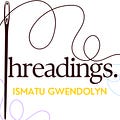
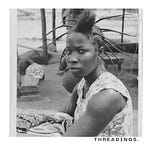


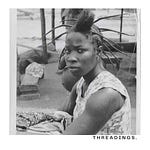

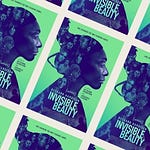


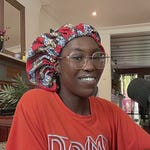
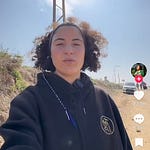
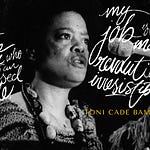
From The Vault: Advice, Three Years or so After My First Wedding